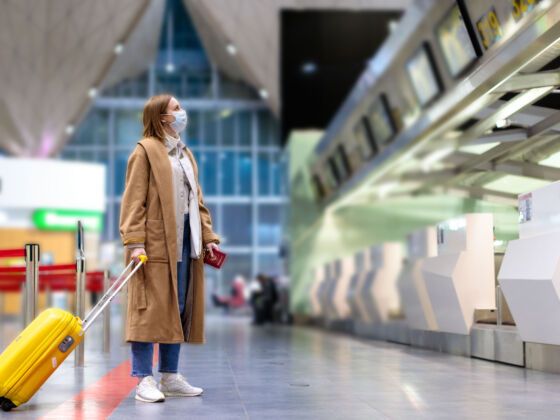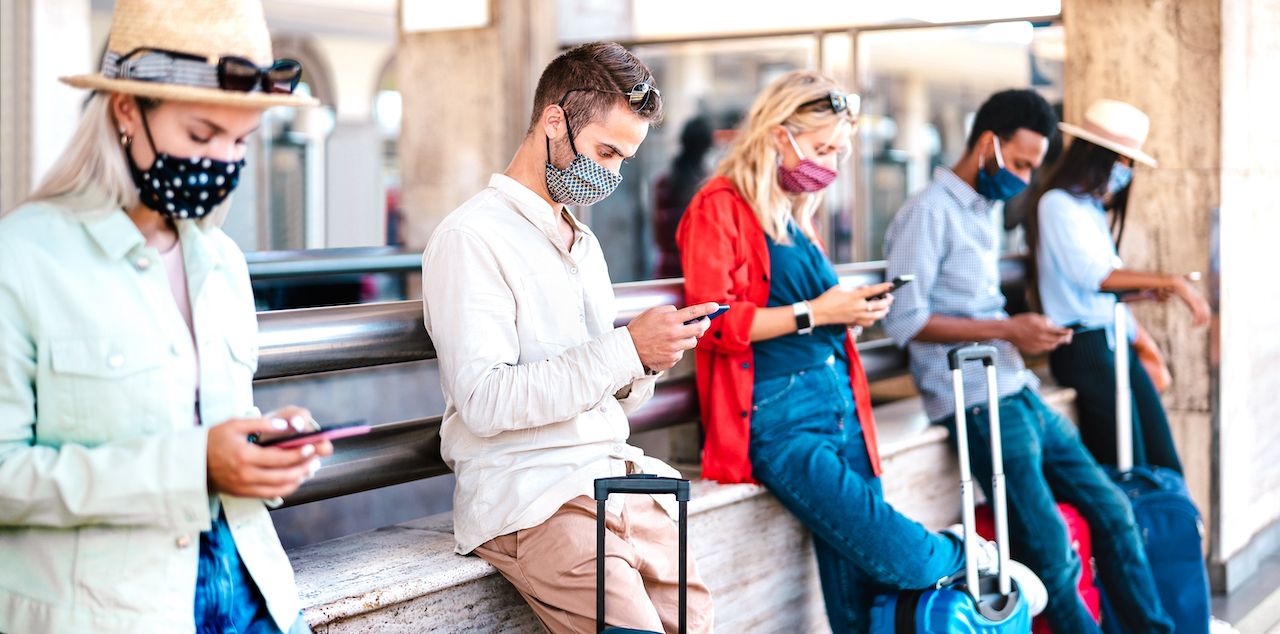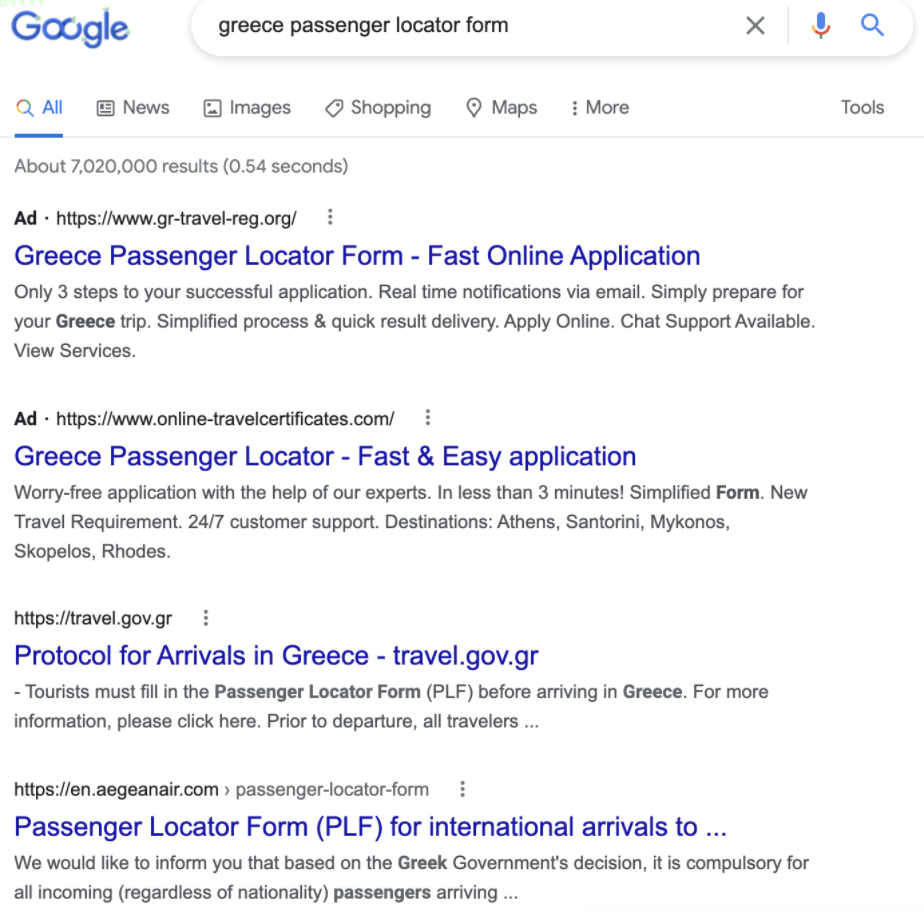The world is slowly starting to open up again, and many travelers are itching to hit the skies after almost two years of lockdown. However, the world has changed, and travel can be extremely confusing with COVID-19 testing procedures and requirements. Depending on where you’re going, what the regulations are, and what airlines require of you, there are dozens of things to add to your “must-do” list for travel. We’ve decided to compile the top 5 questions we’ve been asked about travel so you can get on that plane without missing a step.

All Your 2022 Travel Questions Answered, From Vaccinations to Testing to Flight Cancellations
Do I need a PCR test or vaccination for my trip?
In short, probably. The longer answer — it depends. PCR tests became the norm for many countries as they reopened, even in 2020. As vaccinations started rolling out across the world, many countries have added the vaccine as a requirement for entry, either in place of a PCR or antigen test, or along with a PCR or antigen test. Anywhere from Anguilla to Zambia, requirements call for some combination of testing and vaccination.

Photo: View Apart/Shutterstock
To make matters more complicated, even if the country you are traveling to does not require either today, it does not mean they won’t change their rules by the time you travel. It’s absolutely imperative that you stay up to date on the regulations before and during your trip. There are also a few things to keep in mind when it comes to testing and vaccination:
-
- What airline are you flying? Some airlines, regardless of what a country requires, are at a minimum requesting a PCR test to board the plane. Be sure to check your airline’s COVID-19 FAQs to ensure you meet their requirements. I recently checked into a flight where a traveler next to me was denied his boarding pass because he did not have a PCR test. He insisted his destination did not require it, but he failed to check the airline’s regulations, which unfortunately meant he was unable to fly.
- Do you have a layover? Some countries may require testing or vaccinations to even transit through their airport. Be sure to check the government websites for both your transit country and destination to verify all requirements, as it’s possible that even if your destination does not require a test or vaccine, your transit airport might.
- What is your final destination? Depending on the country, you may be required to have a test and/or vaccine. CNN offers a pretty comprehensive, updated list that you can take a look at, here. Keep in mind, as well, that depending on the country, you may have to meet certain requirements to access certain areas of the country or certain types of activities or facilities. For example, during a recent trip to the Maldives, I was not required to be vaccinated if I was staying at a private island hotel. However, if I were to have booked a stay on a local island, it would have been required.
- If your travel requires a test, be sure you know the time restraints on it. Like much of the Caribbean, Maldives, and others, many countries require a PCR or antigen test within 72 hours of travel. Some countries may require a test within 24 or 48 hours of travel. This time limit is often down to the hour, so be sure you meet those time regulations beforehand. And no, the airline will not accept any excuses. You can try and chance it, like someone I met at the airport recently who got a test 7 days out, but just like him, you may end up screwed and miss your flight.
- Does your destination require a specific type of vaccine? Most countries acknowledge the major vaccines like Johnson & Johnson, Moderna and Pfizer. If you got vaccinated with some of the other globally available vaccines, be sure to check the government websites to make sure they accept them. This is particularly important if you are taking a cruise. Many cruise companies are being extremely strict with the types of vaccines as well as how long ago you received them.
Vaccine or PCR test aside, it’s also important to check if you need to complete any paperwork prior to your departure. Many countries are requiring “passenger locator forms” to be completed before you leave your home country and travelers receive a QR code that’s necessary to enter their destination. For example, Greece requires this at least 24 hours before your departure from home.
One important note about the locator forms — make sure you are accessing the actual government forms and not a scam website. There are a number of websites claiming to be the passenger locator form but often require you to pay. For example, when you search “Greece passenger locator form” on Google, you will see:

Photo: Google
Notice that the first two links are actually NOT on the government website, denoted by their URL. The third link is the true government site: travel.gov.gr. This is also the only site that will not charge you to complete the form. If you are uncertain, be sure to call your airline to get the correct link.
Do I have to wear a mask to travel?
In most cases around the world, you are still required to wear a mask the moment you step into the airport, all the way through to your destination. While you may have heard that several Scandinavian countries no longer require masks within inter-region flights, this is a rare case. In the US and across the world, airlines continue to require face masks, and in most cases, medical-grade face masks onboard.
Do also keep in mind that the country you are traveling to may also have COVID-19 restrictions and requirements in place. For example, the Dominican Republic requires face masks in all public areas, including grocery stores and shops, but those rules do not apply to resort properties. While your hotels and tourist locations may not require them on property, be aware of the laws if you plan to venture into town or local areas.
If I leave the US, are there any requirements to get back in?
If you plan to take a trip abroad, you must be sure you can meet the requirements to get back in. Since January 26, 2021, any traveler planning to return to the US must hold a PCR test, viral antigen test, or proof of recovery, regardless of vaccination status. If you are unvaccinated, you must complete the test within one day of your flight. If you are vaccinated, it must be completed within three days of your flight. Viral antigen tests are typically less expensive than PCR tests and have a much quicker turnaround time for results. However, since PCR testing is the standard worldwide, it may be easier to find PCR testing in some clinics.
When planning your trip, it’s important to remember that you will need to get a verified test to come back home. Many destinations worldwide, like the Maldives, Mexico, and the Dominican Republic, offer government subsidized testing onsite at their hotels. The Dominican Republic, for example, even provides complimentary antigen testing for all guests of the hotel. If you are planning to stay in an Airbnb or apartment, be sure to ask the host about clinics in the area that can accommodate you, or check with your departure airport to see if they offer rapid testing.
While many at-home testing kits have become available, it’s important to remember that not all of these tests are approved for re-entry into the US. In fact, only a couple at-home testing kits available at your local pharmacy will suffice, and it’s required that they include a telemedicine portion, like Abbott’s BinaxNOW. But at $150, it’s not cheap, and many countries offer viral antigen testing for around $20-40. However, if you’re looking for peace of mind and not exploring the local clinics, this could be a good option.
What happens if my flights get cancelled?
Every week, there are dozens of articles and news clips detailing the hundreds of thousands of delayed and cancelled flights. Whether they’re claiming the elusive “air traffic control” or the shortage of flight attendants and pilots following the vaccination requirements, it’s disruptive and frustrating for travelers. It’s critical to make sure you have a Plan B and sometimes even a Plan C.
First things first: make sure you book that flight on the right credit card. American Express Platinum and Chase Sapphire Reserve & Preferred offer excellent travel protections in the event that things go wrong. Whether you need a hotel room for a night while you await your rebooked flight or amenities and toiletries when your luggage inevitably gets lost, they have you covered. Booking on the right card can be the difference between sleeping on that airport floor or resting easy in a decent airport hotel room.
Second of all, the moment that flight is canceled get in line at the airport counter and get on the phone in case customer service picks up first. One pro tip here: if you are flying American Airlines, United or Delta and have lounge access (like you would if you booked your Delta flight on the AmEx platinum), go straight to the counter at the lounge. They are much faster and can get you rebooked ASAP. This happened to me recently on a flight to Paris. We were sitting in the lounge when we saw the cancellation and the Delta customer service counter helped us immediately. Within five minutes, we were rebooked on an Air France flight that actually arrived earlier than our original flight.
Lastly, be sure to get to the bottom of who’s “fault” it is and what you’re entitled to. If the airline cancels on you, they have a few “outs,” namely weather and air traffic control issues. However, if it’s due to staffing or other issues, you are required to be rebooked and accommodated at no expense to you. Gather all receipts, proof of cancellations or delays and be sure to call your credit card company to open a claim immediately.
Is now the time to book non-refundable travel?
If there is only one thing you take away from this entire article, let it be that now is absolutely 100% NOT the right time to go non-refundable, particularly if you are a few months away from your trip. Whether you’re booking holiday travel or your spring break trip to Cabo, going non-refundable is just asking to lose money. There are some fantastic deals out there right now to travel into 2022, and you should absolutely take advantage of them. However, be sure that they offer changes or cancellations.
Given the current travel climate, many companies are very flexible with free changes and cancellations, so there really is no reason to go with the most strict booking terms just to save a few bucks. While the deal might seem amazing, it’s simply not worth the risk in case the country shuts down, your flights get canceled, you fall ill, or the trip just doesn’t happen.
Many hotel loyalty brands offer elite status holders, or even basic members, free cancellations or changes on their discounted rates. So be sure to join loyalty programs as you book hotels to get the best rates with the best booking rules.
Conclusion
If you’re still reading this, congratulations, you’ve made it to the end. To sum things up, travel is hard right now. It’s confusing, stressful, and can honestly be exhausting. However, knowing the rules, being prepared and having a Plan B(C, D, etc.) can make things so much easier. Remember to document everything, print copies of your tests and vaccines and be sure to book those flexible rates whenever possible. From one traveler to another, take a deep breath, don’t worry, you got this.